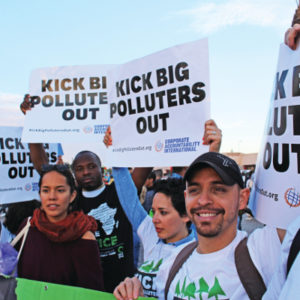Statement by Ashka Naik, Research Director, and Rachel Rose Jackson, Director: Climate Research & Policy at Corporate Accountability.
You read that right. Global corporations actually “sponsor” arguably the most important intergovernmental negotiations of our time. This is not the invention of a satirical magazine like the Onion. And one of the world’s biggest beverage corporations and its biggest plastic polluter is the newest “supporting sponsor” of the next round of climate treaty (UNFCCC) talks in Egypt this November, the 27th Conference of the Parties (COP27). This is just the latest signifier of how deep-seated corporate capture of the United Nations is, under the guise of so-called “multistakeholderism.” Instead of regulating the very corporations overwhelmingly responsible for the majority of global emissions to-date, polluters are offered “unique opportunities” to sponsor policy negotiations to address the global crises they play an active role in exacerbating.
The unfortunate reality is such an opportunity is anything but unique for these climate talks. Long before Corporate Accountability, Corporate Europe Observatory, and its partners began documenting the ways Big Polluters infiltrate and undermine climate action, global corporations have been exploiting international policy arenas to greenwash their image and influence a process already deeply compromised by industry interference. And it should surprise no one that corporations with some of the largest carbon footprints, poorest records on human rights, largest lobbying budgets, and lasting impacts on public health have been the most eager to seize said unique opportunities.
After all, the United Nations Framework Convention on Climate Change sets no lasting controls on corporate sponsorships for climate talks, let alone any of the other ways Big Polluters are granted unrestricted access to the talks. The host country can choose the rules it plays by. The United Kingdom, for instance, prohibited fossil fuel industry sponsorships, but left the door open for a host of other high polluting corporations. Can you imagine tobacco corporations sponsoring global tobacco treaty talks (sidenote: countries had the foresight to prohibit as much)?
But somehow, Coca-Cola fits the mold for Conference of the Party (COP) sponsor, even though its unhealthy products play an indisputable role in fueling the non-communicable disease epidemic across the world, its extractive practices continue to undermine people’s basic human right to water in the Global South, and its political giving advances voter suppression policies further disenfranchising Black people in the U.S. This is not to mention one of the most glaring aspects of Coca-Cola’s inherently unsustainable and climate destructive business model, its mass production and distribution of beverages deeply harmful to public health in petroleum-based packaging to every corner of the earth. And to guarantee its ability to continue polluting, and operating even, it then invests in a wide range of political instruments (like this, this, and this) in an attempt to stave off regulation and mute scrutiny of its deep and lasting harms.
What’s more, despite operating in some 200 countries and facing strong investor demand, Coca-Cola has continually failed to disclose its global political spending and interference in full. It may not want the world seeing everything it does to profit at the public’s expense by obstructing lifesaving policies from soda taxes to front of package labeling. Yet it has an open invitation to lavish money on a convening of global governments.
And, Coca-Cola is already a part of a range of U.N.-sanctioned greenwashing initiatives as well as voluntary, unenforceable corporate commitments aimed at supplanting binding limits on GHG emissions. As with such initiatives like the U.N. Global Compact, we see this sponsorship as an attempt by Coca-Cola to pose as a savior in solving a problem it continues to worsen, to justify continuing its abusive business practices, and to protect its brand image.
And to be sure, the ethos that corporate sponsorships of treaty talks and much ballyhooed voluntary business initiatives represent doesn’t stop at the door of official negotiations…it permeates them. For years, Global North countries, buoyed by legions of industry lobbyists, have mired talks in discussions of false market solutions to the climate crisis, such as ineffectual carbon trading schemes and as yet unproven carbon removal technologies, slowing progress on the real and proven solutions we so dearly require to a near standstill.
So we ask Parties to the UNFCCC and its Secretariat: “What is the policy rationale and value proposition for celebrating Coca-Cola and those corporate sponsors to be announced in the weeks ahead on social media?” What corporations like Coca-Cola supposedly make possible through such a partnership cannot outweigh the potential harm of giving a major global polluter such a mantle. We urge Parties to finally put an end to this practice. To safeguard negotiations from the profit motives of polluting industries. To serve their commitments to the people of the world. Civil society has called for an Accountability Framework. Now is the time to adopt one.



